Mind the Gap
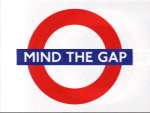
Synopsis
Usual three contestants on the buzzers in rounds sort of show.
The game board is roughly zone 1 of the normal London Underground map but with all the non-interchange stations removed for simplicity.
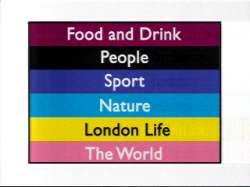 The question categories
The question categoriesEach different coloured line is given a category, so the green District line might represent Music, the Bank line may be Science, and so on.
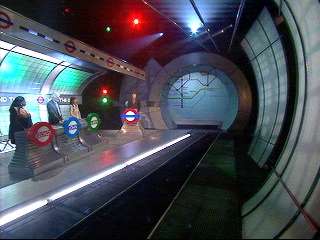 The set of Mind the Gap
The set of Mind the GapSet is a side-on Underground platform - very nicely executed, with the proper LU symbols and typography. The tunnel contains a massive screen which displays the Tube map, and seems to use a projector rather than a TV wall. Music is a jazz-style affair, with a kind of scratching sound effect of a man going "M-M-M-Mind the Gap" over the top.
The computer graphics they use for the map are quite neat - no BBC Micro stuff here, thank you very much. One of the problems they've had to work around is that the lettering is weeny when the whole map fills the screen, so they have to zoom in at various different places so that you can understand where they are.
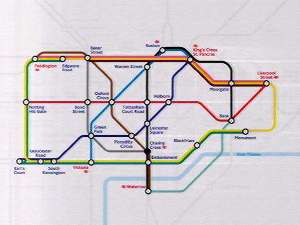 The game board
The game boardIn Round 1, contestants must change lines after each question, if possible. The questions are general knowledge, although there is a London Life category too. The computer appears to decide which direction up/down the track they travel. Once the "cursor" has been to one station, it doesn't go there again. Fast moving buzzer round.
In Round 2, there is a 60 second film in three parts about a range of London landmarks. Each contestant is challenged to spot the mistake in each film and answer an observation question in their 20 second segment.
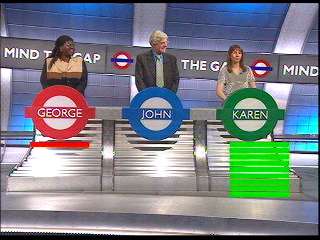 At the end of Round 2, Karen has nine stations, George has one, and as for John...
At the end of Round 2, Karen has nine stations, George has one, and as for John...In Round 3, they go back to the map but this time only the yellow Circle line is shown. The number of questions (or "stations") they have got right equates to where they start around the circle. Each player is asked three True or False questions - some bizarre, some standard. Correct answers mean you move one station clockwise around the circle, anticlockwise for incorrect.
Then the break...
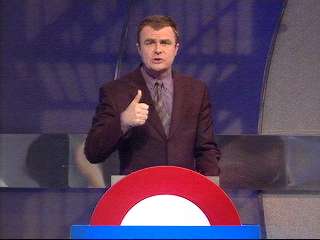 Host, Paul Ross
Host, Paul RossRound 3 continues with more T or F questions. The player who is furthest behind loses. I'm sure they could have done more with this.
Round 4 is like round 1, but the two remaining contestants can stay on the same line if they wish. This means you can try to monopolise your favourite subjects. For my money, this is the only round of the show that properly uses the concept.
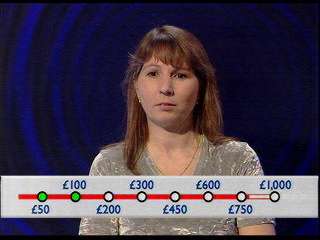 The winning contestant plays on the Money Line
The winning contestant plays on the Money LineThe winner goes on to play on the Money Line. They have to answer eight questions in 60 seconds. A nice touch here is that each correct answer lights up a station, but the tube line connecting the stations is the timer (a bit like on Runway), so you get to see whether they are ahead or behind "schedule".
Another thing that's nice is that the buzzers show you who buzzed first (flashing light) and second (static light) so that the second fastest person to buzz always gets the question when offered.
Slightly disappointed they didn't make more of the London aspect. In addition, they could have including some more thought-provoking questions - things like "How many tube stations end in ...Park", "Which is the only station which appears on both the London and Paris underground systems?" and so on. Around 10 to 20% of the general knowledge questions were extremely old hat.
It does work as a show, but it's hardly addictive. But well above average for the usual local quiz show, and we give it lots of kudos for that.
Inventor
Co-developed by the Chatterbox Partnership.

